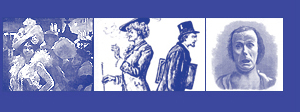Biographies
John Conolly (1794-1866)
John Conolly (1794-1866) was a fervent advocate for the ‘mad’ in nineteenth-century England. He is remembered today for his introduction of the system of ‘non-restraint’ at Hanwell lunatic asylum, a pioneering act which positions him as a radical reformer in the mold of Tuke or Pinel. He was born in Lincolnshire in 1794 and after marrying in 1817, Conolly determined that his future prospects lay in the field of medicine. Training in Scotland, he was soon introduced to the world of the insane. His M.D. dissertation of 1821 was devoted to insanity. In the early years of his career, he moved several times, unable to secure a permanent position. He was conscious of the dangers of financial instability, and so must have been relieved to accept an appointment in London in 1828 as a Professor of the nature and treatment of diseases at the new medical school of the new University of London. In 1830 An Inquiry Concerning the Indications of Insanity was published. It detailed his radical opinion of the treatment and care of lunatics. As Scull, Mackenzie and Hervey point out in Masters of Bedlam (1996), Conolly recognized the potential dangers of institutional treatment. Too often, he felt, the sane were wrongfully sent to asylums. Similarly, lunacy certificates of admission were too often signed without due consideration for the individual involved. In both respects, he challenged contemporary medical orthodoxy. In exposing the potential for wrongful incarceration, he also cemented the literary potential of the lunatic asylum and its physicians and patients.
Despite auspicious beginnings, growing bureaucratic tensions at the University led to Conolly resigning within six months of giving his inaugural lecture. Again, he experienced a period of unfulfilling and short jobs. His career prospects looked dim until he applied for and secured the post of superintendant of the Middlesex County Lunatic Asylum at Hanwell. It was here that Conolly transformed asylum care which in turn led to new, humane attitudes towards the insane. As he thrived in the new position, his earlier concerns about the therapeutic benefits of the lunatic asylum diminished. Hanwell was an asylum which based its treatment on the humane principles of moral treatment pioneered by Tuke at the York Retreat. Conolly was a fervent advocate of the system of ‘non-restraint’, a system he details throughout his writings.
While at Hanwell he cemented his reputation as an expert on mental diseases and as a humane, kind, and gentle social reformer. This led to new opportunities, testifying at commissions in lunacy, becoming a medical witness in criminal trials, and advising on well-publicized cases of confinement such as that of Rosina Bulwer Lytton. Yet as Conolly’s public profile increased, so too did suspicions that he was unduly profiting from his ‘expert’ (and financially lucrative) interventions. In the opinion of some, he had been guilty of the very act he himself had been critical of: admitting to lunatic asylums patients with questionable insanity and debatable mental incompetence. As his professional status was challenged, he was forced to turn to the private trade-in-lunacy. Again, he was derided for defending the very institutions he once criticized. Despite the contradictions inherent in his career, John Conolly is remembered today as a powerful advocate for the rights of the insane and as a supporter of the lunatic asylum as a site of care and cure. He was, foremost, a proponent of moral treatment, a philosophy which profoundly reconceived the relationship between the lunatic and society at large in nineteenth century England. He died in March 1866.
An inquiry concerning the indications of insanity, with suggestions for the better protection and care of the insane (1830)
Construction and Government of Lunatic Asylums (1847)
The Treatment of the Insane without Mechanical Restraints (1856
Essay on Hamlet (1863)
